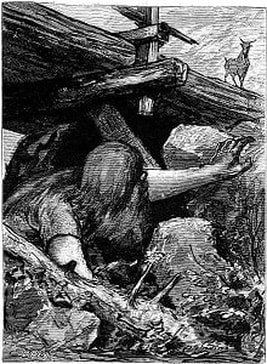Troll
 Troll is an Old Norse word from Scandinavian mythology and folklore referring to a malevolent giant supernatural being not of the human race, an evil spirit, or a monster—an ungainly creature that walks clumsily. However, by the 19th century, such trolls seemed to have shrunk—in Sweden and Denmark they were regarded as dwarfs or imps (small or baby devils) who lived in caves or underground. Trolls had become more mischievous than malevolent.
Troll is an Old Norse word from Scandinavian mythology and folklore referring to a malevolent giant supernatural being not of the human race, an evil spirit, or a monster—an ungainly creature that walks clumsily. However, by the 19th century, such trolls seemed to have shrunk—in Sweden and Denmark they were regarded as dwarfs or imps (small or baby devils) who lived in caves or underground. Trolls had become more mischievous than malevolent.A related Swedish word trolla means to charm or to bewitch; a related Norse word is trolldomr (witchcraft).
The verb ‘to troll’, from Proto-Germanic truzlanan, Old High German trollen (to walk about with short steps) and Old French troller (to wander without purpose), came to English in the late 14th century meaning ‘to go about, to stroll’. Later, in the early 15th century, ‘to troll’ meant ‘to roll from side to side, to trundle’ (trolley is a related word). In the 1560s, ‘to troll’ meant to lure with a moving bait, to entice, or to allure (similar to the verb ‘to trawl’ used in relation to fishing). ‘To troll’, meaning to cruise in search of homosexual encounters, is first recorded in 1967.
The internet sense of ‘troll’ is from the late 1980s and early 1990s. There are several theories of when and why this sense of troll and trolling first appeared. However, the sense of an internet troll as a mischievous and/or malevolent person is a recurring theme. Whether an internet troll is a giant or a dwarf is not so much related to its size as it is to the influence of the troll on shaping or disturbing the perspective of the listener or reader.
https://en.wikipedia.org/wiki/Internet_troll
Reference: Online Etymological Dictionary, https://www.etymonline.com/
Published on September 02, 2021 21:08
No comments have been added yet.



